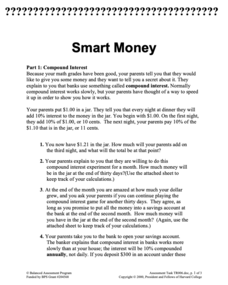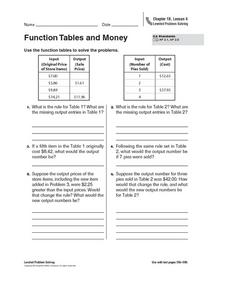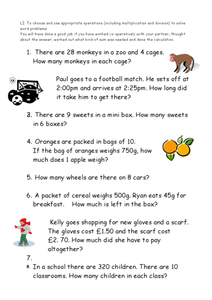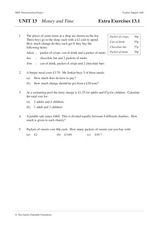Illustrative Mathematics
Money in the Piggy Bank
It's time to crack open that piggy bank and see what's inside. First, count up the pennies, nickels, dimes, and quarters, identifying what fraction of them are dimes. Then calculate the total value of the coins, writing another fraction...
Illustrative Mathematics
Sharing Prize Money
When three classrooms are to split up prize money, your mathematicians must find the percentage that each class deserves and calculate the total amount. There is an option to use a calculator and practice rounding.
Concord Consortium
Smart Money
Watch the money grow daily. Scholars tackle a problem to determine how much money they will have if a dollar grows at 10 percent compounded daily after a month. Using that knowledge, learners notice the difference between varying savings...
Curated OER
Calculate the Mean
Give mathematicians some guided practice in calculating mean averages. They use examples as guides before completing four different sections to build on this skill. First, learners determine the mean of eight pairs of whole numbers....
Mathed Up!
Money Problems
Mo' money, mo' problems! But don't worry, here is an assessment that proves to young mathematicians that they can solve actual money problems. The resource includes 11 money problems involving addition, subtraction, multiplication,...
Creative Chemistry
What is the Percentage of Copper in "Copper" Coins?
Whether in the UK or the US, the mass of the copper in a copper alloy penny can be determined. If you are in the US, note that on the lab sheet, a penny is identified as a "1p piece." The penny is dissolved by young chemists in nitric...
Curated OER
Everyday Mathematics: Coins
In this counting coins worksheet, students receive help from an adult to find the total value for the pictured coins. The objective is to enhance students' counting money skills and skip counting skills.
Mathed Up!
Exchange Rates
Eleven questions make up an eight-page practice exercise that focuses on how to compute exchange rates. Money used is the American dollar, Euro, and British pound.
Illustrative Mathematics
Margie Buys Apples
One of the most common, everyday applications of math is dealing with money. This single problem calculating how much change Margie receives is more involved than it appears at first glance. An understanding of how fractions and decimals...
Curated OER
Calculator Activity: Dollars and Cents
In this using the calculator to solve addition and subtraction money problems worksheet, students follow the steps to enter and solve the dollar and cents problems. Students solve seven problems.
Teacher Created Resources
How to Calculate Discounts and Sales
Teach discounts and sales with a straightforward learning exercise. After reviewing the concept, pupils solve word problems related to dollars and percentages. The second half of the sheet prompts learners to continue solving problems...
SaveandInvest.org
Introduction to Earning Interest: Middle School
Does your bank pay you for allowing them to hold your money? Class members research three different ways they can earn money using money already in the bank. Topics include certificates of deposit, statement savings accounts, and...
Texas State Energy Conservation Office
Cost-Effective Buying
Middle school energy experts read about the relationship between energy use and cost-efficiency. Then they work through a couple of scenarios to determine which approach is more cost-effective.
Curated OER
Function Tables and Money
In this function tables, money instructional activity, students examine 2 different function tables, where they are given input information. Students determine the rule of the function table, then calculate the missing output values. The...
Curated OER
Mental Math and Money Problems
In this money instructional activity, students find the total cost of buying items by adding European money using mental math. Students complete 12 problems.
Curated OER
Dollars and Cents Word Problems
These are some cheap items! Learners explore cost with this addition word problem which has them examine the price of a baseball and a pencil. They add them together to find the total spent. Because there is an explanation below,...
California Education Partners
School Supplies
Make sure to get enough for everyone. The three-part assessment task requires scholars to calculate with decimals. Learners determine the cost of school supplies and whether the teachers have ordered enough. The assessment is the sixth...
Curated OER
Everyday Problems
Word problems are some of the most applicable ways for scholars to approach math, and this is no exception. Using their addition and subtraction skills in context, they solve five word problem scenarios involving time and money. There is...
Curated OER
Operations Word Problems
Challenge your class with this problem solving instructional activity. Learners answer the seven problems using division and multiplication skills.
DK Publishing
Subtraction Practice #2
Do your second and third graders need more subtraction practice? Use a worksheet to help them master their subtraction skills with two digit numbers. The first section involves straightforward subtraction problems, while the second...
Baylor College
Food: The Math Link
Enrich your study of food science with with these math worksheets. They offer a variety of food-related word problems that are great practice for multiplying, identifying fractions, estimating length, and performing calculations...
Curated OER
Calculating Simple Interest
Interest can be both a best friend and an enemy...show your learners how it can manifest through this set of 10 word problems. For each, they calculate time, principle, interest, or rate and choose an answer from multiple choice...
Baylor College
Calculating Exponential Growth
There can be a steep learning curve when teaching about exponential growth, but the lesson helps kids make sense out of the concept. When talking about exponential growth of viruses, learners may not be very interested, but when you are...
Curated OER
Money and Time
In this algebra worksheet, students relate real world scenario to algebra. They use a mane to make choices when given a limited amount to spend. They complete a money maze and calculate the shortest distance between different cities.























